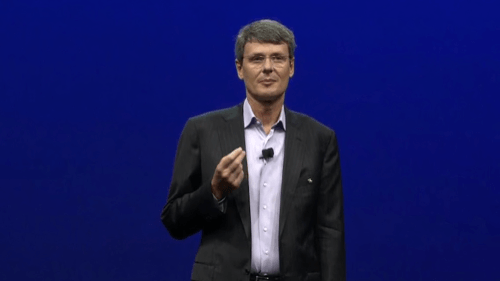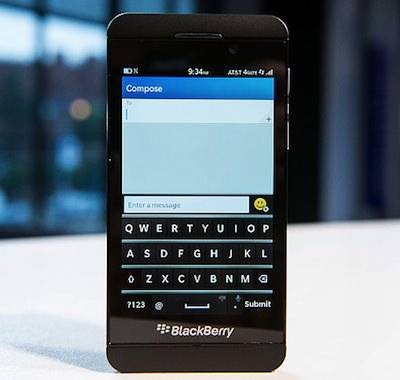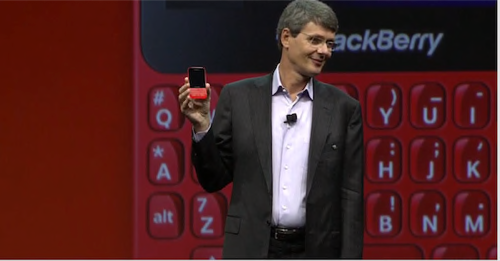
In front of a packed house at the Marriott World Resort in Orlando, BlackBerry President and CEO Thorsten Heins proudly showed off the company’s newest devices, including the low-end Q5 designed for developing markets, talked-up the company’s updated BB10 platform (10.1) and announced that BBM (BlackBerry Messenger) was going cross-platform.
Heins was generally upbeat, declaring this year the company’s “best launch year ever,” all the while gleefully taking swipes at the competition. The market will decide, of course, though this morning’s celebratory keynote was clearly designed to ensure all that BlackBerry has emerged from the last few years of painful market declines and is eager to take on the competition.
Z10. Q10. BB10.1.
Heins took some of his shots at Apple and Microsoft, mocking those who suggest that “people want the desktop experience” on a tablet or smartphone. “Really,” he mocked. “It simply doesn’t work. That’s why we built BB10 specifically for a pure mobile experience. We don’t serve the desktop market. We are mobile first – the original mobile first.”
Heins then showed off the Z10, which he described as “Perfect for people who want the all-touch experience.”

Heins also briefly channeled Steve Jobs: “One more thing: the famous BlackBerry keyboard,” he said as he introduced the Q10. “The best physical keyboard on the market today. No one makes keyboards better than BlackBerry.” (The Q10 is expected to go on sale in the U.S. by June.)
After showing off the company’s two new flagship devices, Heins made the case for why BlackBerry remains relevant in the mobile world. In last four months, he noted, apps for BB10 have increased from 70,000 to “over 120,000” and one third of all developers are now targeting BlackBerry as “their prime platform,” Heins claimed.
Heins also took the opportunity to introduce “BlackBerry Channels,” a media-rich social messaging service. He also reminded the audience of the scope of the company’s messaging service. “BlackBerry Messenger (BBM) has more than 60 million users. More than 10 billion messages are sent every day. Twice the number of any other messaging service.” Another audience wow: BBM is now “cross platform.”
Regarding new app announcements, however, there was very little said. Heins did state that Skype is now available (with the BB 10.1 OS update), but that was all.
BlackBerry Goes Global With Q5
One surprise of the keynote was Heins’ introduction of a completely new “BlackBerry device at a global price range.” He held up the small, colorful Q5 – “our latest Qwerty device, specifically designed for emerging markets. I know it’s going to be a big hit.”
Though he did not provide much detail regarding the Q5, it appears to be a direct competitor to Nokia’s popular Asha line.

BlackBerry On The Offensive
Throughout his presentation, Heins was delivering the smack downs – alluding that Apple’s iOS, Google’s Android and Microsoft’s Windows Phone each had fundamental weaknesses – and that only BlackBerry was “mobile first.” Heins suggested that BlackBerry’s pure mobile focus could lead the company and its new BB10 platform to a global resurgence.
“We are working to win back our traditional customers,” Heins said, “BlackBerry 10, as a platform, is entirely new. This is not an update to an old BlackBerry OS.”
This will not be easy. BlackBerry (formerly RIM), finished 2012 with a 8% global smartphone market share – a significant drop from the previous year. Worse, these numbers are almost entirely based on the company’s once-dominant user base of BB7-based devices. By the first quarter of this year, the company failed to even place in the top 5 of all smartphone vendors. For all Hein’s positive talk, he provided little in the way of actual sales or distribution data.
Despite the many positive proclamations of BlackBerry’s CEO, as the company shifts to a new touch-based and app-centric smartphone operating system its future remains in doubt. Android, iPhone or even Windows Phone may leave little opportunity for the Canadian company to move forward.

















